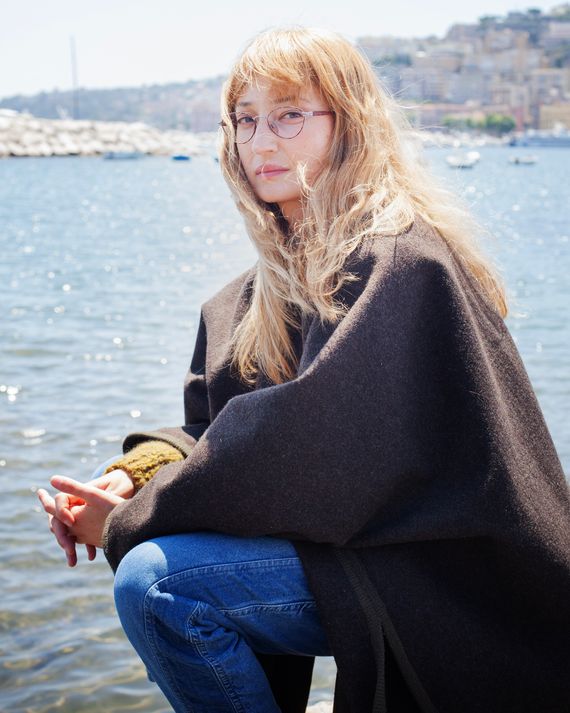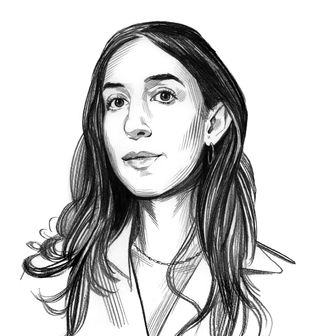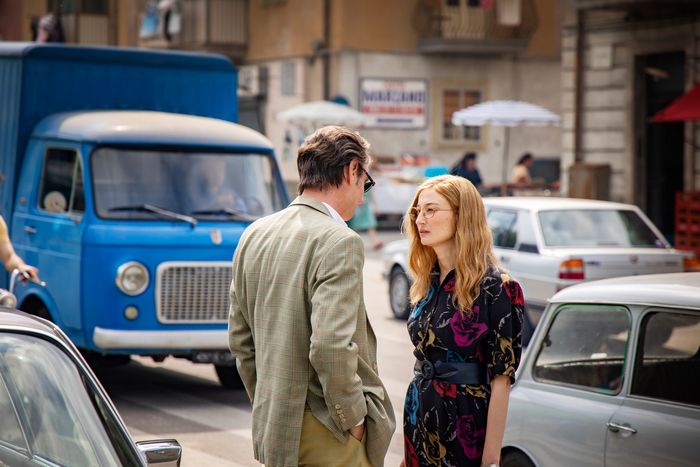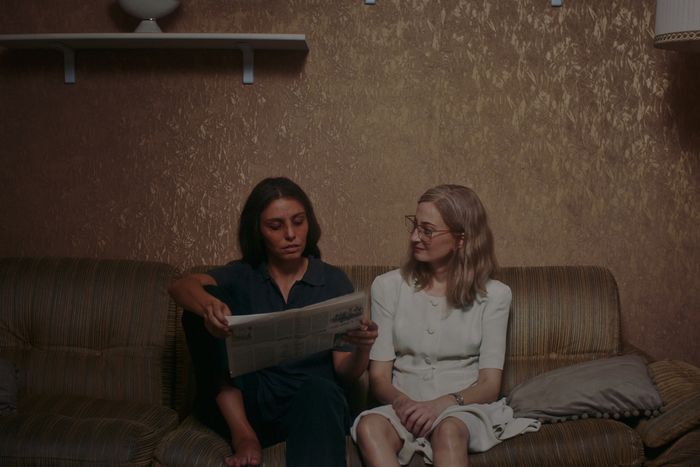
By the time Alba Rohrwacher appears onscreen in the fourth season of My Brilliant Friend, we already know her voice. The Italian actress had been narrating HBO’s adaptation of Elena Ferrante’s novels, about the lives of two book-loving, quietly competitive friends from a poor Naples neighborhood, since its first episode in 2018. But to incarnate Elena “Lenù” Greco in her final form, Rohrwacher faced a daunting task: replacing Margherita Mazzucco, whose brooding portrayal of Lenù from adolescence through early adulthood dazzled viewers in the first three seasons. Rohrwacher “unites the voice to the face,” as she puts it, in the final season, capturing Elena’s strength and fragility at the moment her desires and actions finally align. Now middle-aged and a successful writer, Rohrwacher’s Lenù is more defiant and demanding, even as she maintains the cool observation Mazzucco brought to the part. “It was interesting to be with a character so ambiguous, controversial, and enigmatic,” Rohrwacher, known to American audiences for roles in La Chimera, The Lost Daughter, and I Am Love, says. “I was on her side every day. I understood her and empathized with her. But I was so happy that she slowly freed herself.”
Season four, subtitled The Story of the Lost Child, finds Lenù consumed by her affair with Nino, hauling her daughters back to Naples to live with him and, after he betrays her, growing closer with Lila (now played by the sublime Irene Maiorino) than ever before. The friends each give birth to a daughter, and their girls in turn become inseparable. But as the families grow more entangled, Lenù draws writing inspiration from the violent, impoverished neighborhood — and people — that made her. Although the subtitle refers to the disappearance of Lila’s daughter Tina, in the series finale, Lenù loses her own eldest daughters in a sense: Elsa runs away with Lila’s son Gennaro, whom her older sister Dede had loved for years, while a heartbroken Dede joins her father in America. But the episode, titled “Restitution,” finds its center of gravity in a cutting farewell between the friends. When Lenù says she’s leaving Naples for good, Lila reveals her secret belief that Tina was kidnapped because she had been misidentified as Lenù’s daughter in a press photo. “My success had been responsible for her daughter’s kidnapping?” Rohrwacher narrates over a distraught-looking Elena. “Why did she tell me about it only now? Did she want to inject me with a final dose of poison, to punish me because I was leaving her?”
You’ve been working on this show for seven years. How does it feel to be wrapping it up?
I got to know this character in such a deep and intimate way over time. It was like doing a journey with my voice, trying to attach my voice to someone else, trying to find this voice that could be there but also an ego, a coscienza. Finally having the voice and the face together in season four was like arriving on dry land. We didn’t know when we started how long the process in front of us would be, so when the face and the voice united, I had a sense of relief, of being free. But I also had the responsibility of embodying someone who did such an incredible job before me.
How did you come to this role originally?
I was involved in the project as the narrator of the series. I wasn’t aware at the time that I would become the adult Elena. It was beautiful working with Saverio Costanzo, the creator and director of the first two seasons. We had already done three films together — including Hungry Hearts with Adam Driver — and we share a deep artistic relationship. We are also a couple. I love to work with people I know intimately. I have always loved working with him.
In the darkness of an editing suite, I worked on modifying my voice in order to match Margherita’s. I observed everything about the younger Elena. I spent many days on set watching what they were doing to understand how I can put my voice inside it. I knew the novels well and had always been a huge fan of Ferrante’s work. I’ve been asked to do readings of her books in Italy.
What conversations did you have with Margherita when it was your turn to bring the character to life? What in her performance inspired yours?
Margherita taught me how to be Elena. The Elena she made with Saverio in the first two seasons became the Elena. The goal was for me to arrive at this sort of distance she has as a character. Margherita was very good at being present but always an enigma. Lila is the mysterious one, but I think Elena is the real unknown.
I tried to continue and develop what she did with Daniele Luchetti, a director with whom I’d worked on two films. We started to build the image of Elena to find a similarity with Margherita’s portrayal. I worked obsessively with two dialect coaches to study the Neapolitan accent. Elena doesn’t speak dialect anymore at this point — it’s written that she erased her language with all her strength — so we worked to find the right inflection and the specific melody Margherita had. I never could be Lila because she speaks real Neapolitan. Playing Elena was something that I could allow myself to do.
Daniele and Margherita and I filmed the last scene of the third season, when Margherita sees me reflected in the mirror, in an actual airplane.
What about Margherita’s interpretation did you keep in your mind for your own performance?
How she stares. The way she moves the eyes, the way she was able to stay still, the austerity from the first and second seasons. It’s a balance between the old and the younger character. I tried to keep the first, distant Elena with me, which was the base, the ground. And then slowly, she changes with age.
In season four, we see Elena’s desires and actions align more than ever. She stands up for herself, talks back to her mother-in-law, talks back to her own mom. How did you think about playing into Lenù’s strength as well as her tendency to sit back?
My work was to calm my energy in order to be Elena, to be loyal to what Margherita did before but bring new aspects of Elena.
Where did you find those new aspects?
They came from the book because the book was the Bible. It was always there with me, every day, every night. Elena Ferrante and the show were my world, the only world I had. I woke up, prepared, arrived on set. Reading Ferrante’s pages always put me on the right path. On set, when we had discussions, we’d say, “Okay, let’s go find the answer in the writing.”
In the last book especially, Elena becomes more active. She was able to face her weaknesses. Sometimes when I was reading the book, I had Lila’s voice in my mind saying, “Come on, Elena, come on!”
She lies to herself a lot.
And she’s able to tell the truth about everybody else. She became an incredible writer because she has this ability.
That’s an interesting tension — the book is written from her perspective and the world is given to you through her eyes. Whereas in the adaptation, you have at least the sensation of objectivity. You see her lie to herself, you see her faults. How did you think about playing Lenù as she sees herself and as she’s seen by other people?
There’s this voice-over after Lila’s monologue in the earthquake sequence when she finally calms down in Elena’s arms. She says something that was very helpful to understand the new Elena: “For the first time in my life, I realized how strong, even ancestral my strength was. Even in the chaos of life, when everything crumbles, I was able to put all my thoughts in proper order.” Maybe at that point, she finally realizes the truth about her strength, which is something that we can see but she doesn’t.
Because she outsources her strength to Lila.
Lila is the driving force, the mystery she’s following. There’s a scene from season one that helped me understand the characters. Lila wants to go to the sea, and Elena is afraid to skip school. They hide their book bags and start walking under the bridge. After they pass the tunnel, the horizon appears and Lila freezes. It’s Elena who says, “Let’s go.”
There is a phrase in Italian, lei cammina in il mondo, which is like “She walks in the world.” Elena goes horizontally, she’s epic. The epic is something large. She moves, she discovers. And Lila — she digs. She’s vertical, like a Greek tragedy. She goes into herself.
How was working with Irene Maiorino as a scene partner?
We didn’t know each other, so we started to get to know each other through the characters we played. There was a strange, strong energy between us that made every moment very charged. I think it’s the same thing that happened between Margarita and Gaia, something magic related to the book. The energy of this character had never happened to me. It’s so strong that when you embody Lenù with somebody else playing Lila, the written relationship immediately becomes real.
How was Ferrante herself involved with the TV show? Did you ever correspond with her?
She was like a presence. Through her writing, I found the solution of my character. She was involved in the process when they first started My Brilliant Friend, and she had a writing relationship with Saverio. They exchanged so many emails. He had a very special relationship with her. Once they invited him to do a speech with an important writer and journalist in Italy called Goffredo Fofi, and they asked me to read the emails she wrote to Saverio at the Torino book festival. [Whispers] It was incredible. I went through something very intimate, like a treasure.
I’ve never been so involved in a project — I knew every angle. For example, when we filmed the scene with the mother in the apartment in the third episode, I could close my eyes and know exactly where in the space my bed was as a child because I was there when they filmed. When the mother and Elena fight because Elena wants to keep studying and the mother slaps her and her glasses break on the floor — I remembered where they fell. When the mother spoke to me, I had the memory — which was not only a memory that arises from watching what was filmed but a tangible memory from life. During the whole process, I kept dreaming of the past.
This season deals with some of the heaviest material in the story. What was the feeling on set as you inhabited those moments?
Director Laura Bispuri is someone I trust. We’d done three movies together. When the producer called her, I was hoping she’d say “yes,” because for a film director, a TV show is a lot of time. Filming was hard but beautiful. Even in the difficulties, we knew how important it was to keep searching for the right moment, for the right emotion.
Were there any scenes that were particularly challenging to film?
Tell me which one you’re thinking about.
When Elena finds Nino with the housekeeper.
Exactly. So painful. So painful. Shocking! I remember when I read it in the book.
It’s even worse in the adaptation because the camera stays with Elena while she waits for Nino to notice her. We see how long it takes. That was just devastating.
Laura pushed me a lot. I remember that corridor — my heart was like thump thump thump thump because it’s shocking. And then after, with the little daughter in the car with no diaper, there is this moment which was so real: We were waiting in front of the school and she was looking at me and I was devastated, crying. It was totally true. There is another moment about the loneliness of Elena, which is when she gives birth and she’s alone in the car singing to herself.
I was also thinking of after the earthquake. She hasn’t heard from Nino yet, so she and Lila go to his house and he’s gone. The worst is when Lila’s family come back to the rione and Elena’s just there alone.
Life really always slaps her.
This season takes place over many years. How did you approach Lenù continuing to age?
I like Elena in the finale because she reminded me of my mother when I was a child — this kind of woman that is nearly 50, but she’s still young. And not vain anymore, even if Elena’s always a little bit vain — the cut of the hair, the simplicity of the dress.
What is your favorite Lenù outfit or garment from the season?
The glasses. Through the glasses we see her age. They change.
In an interview you and your sister, the filmmaker Alice Rohrwacher, did with Sofia Coppola, Alice said, “Working together can be dangerous for us. We have a very strong relationship, but all of that love can lead to a lot of conflict.” Did you draw from that relationship in embodying the Lila-Lenù dynamic?
Maybe. My sister is my universe. It’s complicated because we share everything and we tell each other the truth. It’s so rare to have people that tell you the truth because sometimes it is painful. But for me it’s a blessing. With Elena and Lila, it’s even more complex because it’s not only about telling each other the truth, it’s about provoking each other. I would never put my sister in danger, and she would never put me in danger. We’ll always protect each other. Conflict might arise when we are doing a scene and I say, “Alice, I don’t believe it.” And she says, “Why don’t you believe it? I’m the director.” Then she speaks about my fragilities because she knows me. I think Elena and Lila are more complex, more dangerous.
It makes me think of the line in the finale when they say good-bye. Elena says, “In the end, I had only run into more proof of how splendid and shadowy our relationship was.”
This was a line that made me cry so much because it’s the truth. But this is friendship, which is different from sisterhood. Because they could put the other in danger. For example, if my sister knows something about my boyfriend, she’d immediately call me and tell me.
Lila holds onto it.
That is not fair. And in episode nine, how strange it is when she flirts with Nino.
How did you think about playing that awful scene after Lenù finds Nino with the housekeeper, when Lila says he’s trying to use Lenù to get to her? It’s like all of her nightmares come true.
I did this [covers ears]. This reaction is from me. It’s not scripted. I think it’s a strange form of addiction they have to each other. But I also think Elena stimulated Lila and Lila stimulated Elena.
And Elena starts to own it. Instead of hiding from the fact that she copied the story that Lila wrote as a child, The Blue Fairy, for her first novel, Elena now freely admits that she needs to talk to Lila in order to get any book idea whatsoever.
It was incredible in the last moment before they say good-bye. Elena says, “If you are writing something, you would show me, right?” Incredible! Lila is destroyed — she’s a ghost, she’s nothing — but you are still in competition.
How does it feel to say good-bye to Elena? Seven years is a long time.
I’m still with her. It’s difficult to let her go. When I finished the show, I went straight to a movie where I played someone completely different, someone completely alive. But Elena was sort of my secret power.
She became your Lila.
Yes. In my acting life, she became my Lila.
More ‘My Brilliant Friend’
- My Brilliant Friend Series-Finale Recap: Mothers and Daughters
- Finding the ‘Crack of Humanity’ in My Brilliant Friend
- My Brilliant Friend Recap: Madwoman in the Attic




